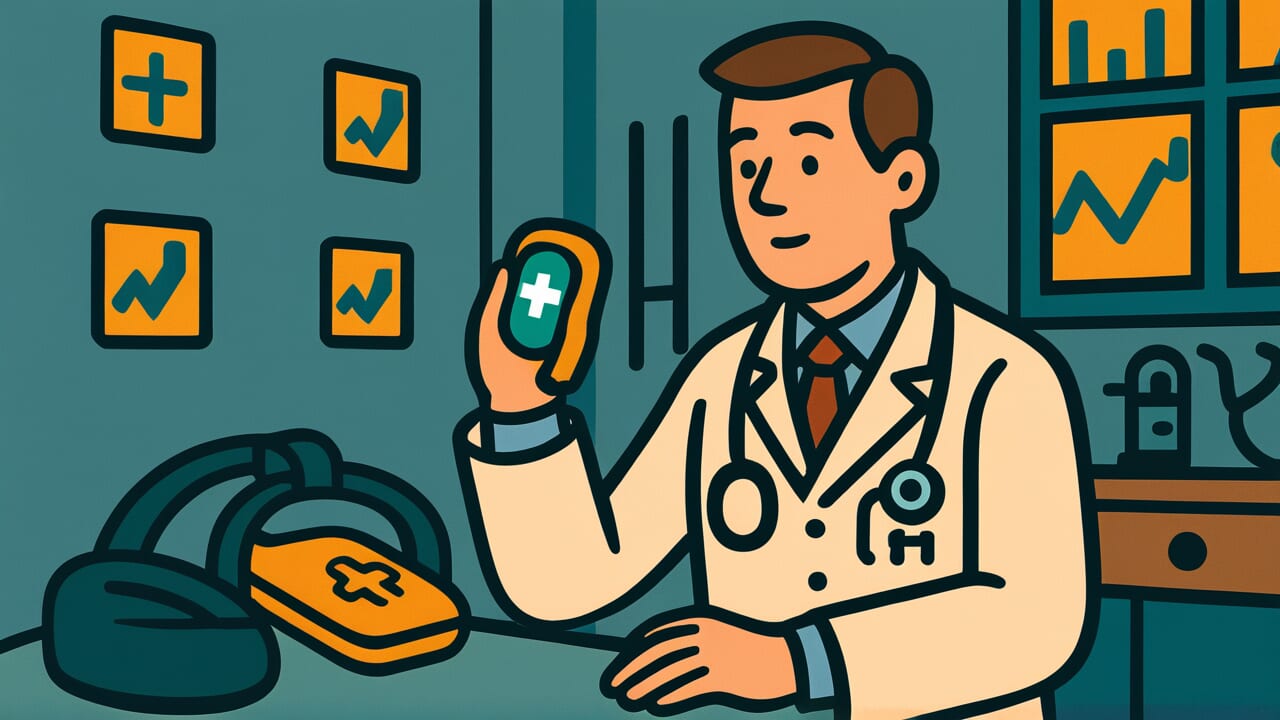How to Read “A doctor’s own pulse reading has no effect”
Isha no jimyaku kikime nashi
Meaning of “A doctor’s own pulse reading has no effect”
This proverb means that even experts cannot view their own situations objectively or handle them properly.
When a doctor diagnoses someone else’s illness, they can make calm and accurate judgments. But when they become sick themselves, anxiety and panic prevent them from making correct decisions.
This applies beyond doctors. A lawyer might fail to solve their own legal troubles. A counselor might struggle with their own emotional problems.
When it comes to ourselves, emotions cloud our judgment. Things we would normally spot easily become invisible to us.
This proverb shows a fundamental human limitation. Even with expertise and skill, we lose objectivity about ourselves. That’s why advice from others and outside perspectives are so important.
Origin and Etymology
The exact first written appearance of this proverb is unclear. However, it was likely already widely used during the Edo period.
The saying probably emerged when doctors became established professionals. They gained social status as guardians of people’s health.
“Jimyaku” means reading one’s own pulse. In Edo period medicine, pulse diagnosis was an extremely important diagnostic technique.
Doctors would take a patient’s pulse to read their body’s condition. Based on this, they would provide appropriate treatment.
What’s interesting is that this proverb doesn’t doubt a doctor’s technical ability. Rather, it points to a fundamental human truth.
Even the most skilled doctor loses calm judgment when dealing with their own illness. They have abundant knowledge and experience with others’ diseases.
But when they become sick, anxiety and fear prevent objective diagnosis.
This expression was born in the medical world. But it gradually became used as a universal truth applying to all experts.
It accurately captures human weakness. When it comes to ourselves, we all become blind.
Interesting Facts
In the medical world, there’s another similar proverb: “Isha no fujōjō” (the doctor’s poor health habits).
This ironically describes how doctors recommend healthy lifestyles to patients. Yet they themselves often live irregularly.
The existence of multiple such sayings proves something important. Doctors have long been familiar figures in people’s lives. Their human aspects have been closely observed.
Even in modern medical practice, ethical codes exist. They state that physicians should avoid treating themselves or family members.
Emotional involvement can cloud judgment. Even experts are encouraged to be examined by third parties.
Usage Examples
- He gives accurate advice about relationships. But when it comes to his own love life, he’s completely blind. It’s truly “a doctor’s own pulse reading has no effect.”
- She’s a successful business consultant. Yet she repeatedly fails at managing her own company. That’s “a doctor’s own pulse reading has no effect.”
Universal Wisdom
This proverb reveals a profound truth. Humans have a fundamental limitation in viewing themselves objectively.
Why do even experts become blind when it comes to themselves?
The answer is that problems involving ourselves always carry emotions. When we look at others’ problems, we can remain calm observers.
But with our own issues, emotions cloud our judgment. Fear, anxiety, hope, and desire all interfere.
When a doctor examines their own illness, fear creeps in. “What if it’s something serious?” Wishful thinking appears too. “I hope it’s nothing.”
This emotional involvement makes them miss symptoms they’d normally spot easily. Or it makes them worry excessively.
There’s an even deeper reason. Humans have a self-defense instinct. We naturally want to look away from inconvenient truths.
Even with expertise, applying that knowledge to ourselves can be painful. So unconsciously, we avoid seeing what we don’t want to see.
This proverb has been passed down for generations for good reason. It acknowledges this inherent human weakness.
And it teaches that we need others because of this weakness. No one is perfect. That’s why we must support each other.
When AI Hears This
The human brain loses the ability to think abstractly when too close to a subject.
In psychology, this is called “construal level theory.” We can calmly analyze distant events. But when something involves us, our judgment suddenly drops.
When a doctor reads their own pulse, observer and observed become completely identical. The necessary psychological distance becomes zero.
What’s fascinating is that this isn’t just a matter of attitude. It’s a structural limitation of the brain’s information processing system.
When diagnosing others’ symptoms, a doctor’s brain operates in “pattern recognition mode.” It cross-references past case databases. It derives the most statistically probable diagnosis.
But when they become the patient, “emotional processing mode” takes priority. Noise like anxiety and fear distorts judgment.
In other words, the same brain switches channels.
“In-group bias” also plays a role. The unconscious belief that we’re special interferes with statistical judgment.
For example, a doctor might think, “This symptom usually means something serious, but in my case it must be different.”
This is the same structure that prevents parents from objectively evaluating their own children. The moment we become involved, our brains are designed to lose calmness, our most important tool.
Lessons for Today
This proverb teaches modern people the importance of humility and trust in others.
No matter how much knowledge or experience we gain, our judgment becomes distorted with our own matters. Recognizing this limitation is the first step toward true growth.
Modern society emphasizes self-improvement and self-analysis. Changing yourself is considered a virtue.
But this proverb teaches the importance of borrowing others’ perspectives sometimes. A friend’s advice. Professional counseling. A colleague’s feedback.
These aren’t signs of weakness. They’re proof of wisdom in knowing your limits.
When making important decisions, when feeling emotional, when stuck on the same problem, seek opinions from trusted third parties.
Even problems you’d normally solve easily might be invisible when they’re your own.
And when others seek your advice, honor that trust. We can all be eyes for each other, mirrors for each other.
This helps us make better judgments. You don’t need to be perfect. We just need to support each other.



Comments